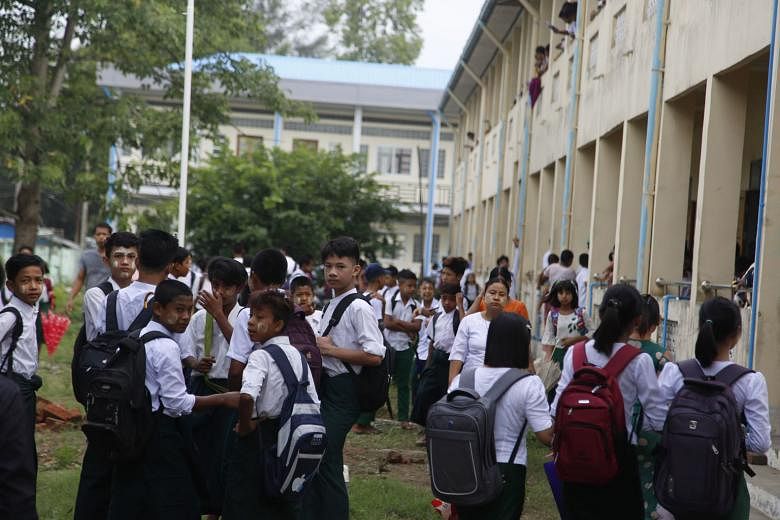YANGON • Myanmar pro-democracy supporters took to the streets yesterday in several districts, as fighting between the army and anti-junta militias raged in border areas, four months after the military ousted an elected government in a coup.
Despite a ferocious crackdown by security forces, Myanmar's military is still struggling to impose order after arresting Ms Aung San Suu Kyi and senior leaders of her party, sparking nationwide protests and paralysing strikes.
In the far south of Myanmar, anti-military protesters staged a march in Laung Lone, a photograph posted by the Irrawaddy newspaper on social media showed.
Meanwhile, in the commercial hub of Yangon, a group of mainly young protesters rallied in the district of Kamayut, photographs posted by the Myanmar Now news portal showed.
"This is not over yet. We still have our turn," read a sign written on a sheet carried by one protester.
Schools reopened yesterday for the first time since the military seized power, but teachers and students defied the junta's calls for full classrooms in a show of resistance.
"I'm not afraid of their arrest and torture," said Ms Shwe Nadi, a teacher from the commercial capital Yangon. Her name has been changed for her safety. "I'm afraid of becoming a teacher who teaches the students propaganda."
The 28-year-old was fired for supporting the civil disobedience movement - one of the thousands of teachers and academics whom the junta has sacked.
Junta-run media has in recent days carried pictures of functionaries watching school registrations and promising that parents will be "satisfied" with the return of classes.
Students at a school near the capital Naypyitaw held a set-piece ceremony to mark the new term by performing a National Enrolment Week song in front of the regime's education minister, according to the Global New Light of Myanmar state newspaper.
Nevertheless, protesters have discouraged parents and teachers from sending children to schools that still have teachers willing to work, saying it amounted to backing the military regime.
Demonstrators in urban areas have had to become more nimble to avoid security forces, often using flash mobs or staging small unannounced protests, after larger rallies in the first months after the coup were often met with security forces firing live rounds.
Decades-old conflicts between the military and ethnic minority armies in border areas have also reignited since the coup.
Ethnic militias allied with a shadow civilian government have stepped up attacks on the army, which has responded with heavy weapons and air strikes, forcing thousands to flee.
Mobile-phone footage obtained from a resident in Kayah state bordering Thailand showed what appeared to be artillery being fired by the military from inside the state capital Loikaw into Demoso, about 14.5km away, where the People's Defence Force said it had attacked troops and was coming under heavy fire.
Residents in Loikaw said that about 50 rounds had been fired on Monday and six yesterday morning.
"The sound of artillery is deafening us," a resident told Reuters on Monday, requesting anonymity due to safety concerns.
The Karenni Nationalities Defence Force, a militia active in Kayah state, said in a post on its Facebook page that 80 army soldiers had been killed on Monday, while one of its fighters and a civilian were also casualties.
Reuters could not verify the claim and a spokesman for the junta did not answer calls seeking comment.
Fighting in Kayah has displaced about 37,000 people in recent weeks, according to the United Nations. Many have fled into jungles and are in need of food and medicine.
Civilian forces, often armed with rudimentary rifles and limited training, have been formed in towns and regions across Myanmar to challenge the military, in support of the shadow National Unity Government that the junta says is treasonous.
Security forces have killed 840 people since the coup, according to figures provided by an activist group.
Junta chief Min Aung Hlaing has said the toll was nearer 300, and has said it is unlikely there will be a civil war in Myanmar.
REUTERS, AGENCE FRANCE-PRESSE

